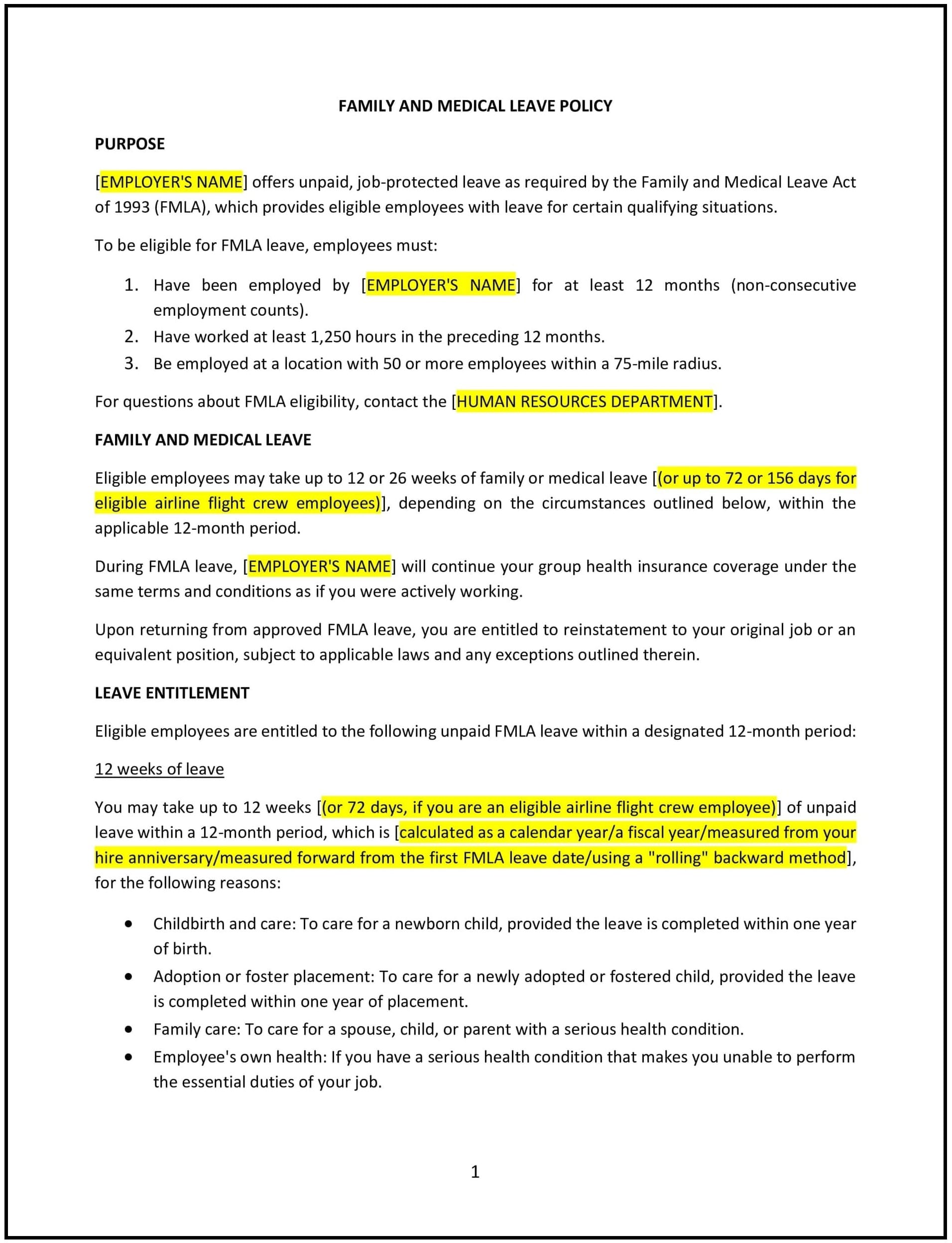Family and medical leave policy (Wisconsin): Free template
Got contracts to review? While you're here for policies, let Cobrief make contract review effortless—start your free review now.

Customize this template for free
Family and medical leave policy (Wisconsin)
A family and medical leave policy helps Wisconsin businesses enhances compliance with federal and state laws, such as the Family and Medical Leave Act (FMLA), while providing employees with the ability to take time off for personal or family health reasons. This policy outlines the conditions under which employees may take family and medical leave, the process for requesting leave, and the job protection and benefits employees are entitled to during their leave.
By implementing this policy, businesses can support employees during important life events while maintaining compliance with relevant employment laws and safeguarding workplace productivity.
How to use this family and medical leave policy (Wisconsin)
- Define family and medical leave: Clearly outline the types of leave covered by this policy, including medical leave for an employee’s own health condition and family leave to care for a family member, such as a spouse, child, or parent.
- Outline eligibility criteria: Specify the eligibility requirements for family and medical leave, including the length of service required (e.g., at least 12 months of employment) and the minimum hours worked (e.g., 1,250 hours in the past 12 months) under the FMLA.
- Provide notice requirements: Clarify the process employees must follow to request family and medical leave, including how much advance notice is required, any necessary documentation (e.g., medical certification), and the timeline for submitting the request.
- Specify duration and frequency of leave: Define the maximum duration of family and medical leave (e.g., up to 12 weeks in a 12-month period under FMLA) and whether leave can be taken intermittently or in a continuous block.
- Explain job protection and benefits: Reassure employees that their job will be protected during their family or medical leave and that they will be reinstated to the same or equivalent position upon return. Clarify how benefits such as health insurance will be handled during leave.
- Address paid and unpaid leave: Specify whether family and medical leave is paid or unpaid. If applicable, explain how employees can use accrued paid time off (PTO) or sick leave to cover some or all of the leave.
- Address state-specific considerations: Include any additional provisions required by Wisconsin state law, such as coverage for employees who may not meet federal FMLA eligibility criteria but are still entitled to some form of leave under state law.
- Accommodate special circumstances: Clarify how the policy applies to special situations, such as pregnancy, childbirth, or adoption. Provide details on how employees can request leave for these specific events and whether the leave is paid or unpaid.
- Ensure confidentiality: Ensure that medical information related to family and medical leave requests is kept confidential and only shared with those who need to know to administer the leave or comply with legal requirements.
Benefits of using this family and medical leave policy (Wisconsin)
This policy offers several benefits for Wisconsin businesses:
- Supports employees during critical life events: The policy provides employees with the time and flexibility they need to care for themselves or family members during significant health events, which can help reduce stress and improve job satisfaction.
- Enhances compliance with FMLA and state law: By aligning with both federal and state regulations, the policy helps businesses stay compliant with employment laws and avoid penalties for non-compliance.
- Promotes employee retention: By offering family and medical leave, businesses can increase employee loyalty and retention, particularly when employees know their job is protected during extended leaves for medical or family reasons.
- Reduces workplace disruption: Family and medical leave policies provide a clear structure for managing absences, which can help minimize disruptions and ensure continuity of operations.
- Improves workplace morale: By demonstrating care and support for employees' well-being, the policy helps foster a positive workplace culture, leading to increased morale and productivity.
Tips for using this family and medical leave policy (Wisconsin)
- Communicate the policy clearly: Ensure that all employees are aware of the family and medical leave policy and understand how it works. Provide detailed information during onboarding and through regular reminders.
- Make the process simple: Streamline the request process to ensure employees can easily apply for leave. Provide a clear form or online system for submitting requests and track all relevant documentation.
- Train managers: Provide training for managers on how to handle family and medical leave requests fairly and consistently, and how to maintain confidentiality and compliance with the policy.
- Monitor leave usage: Keep track of family and medical leave usage to ensure compliance with the maximum duration allowed under the policy and avoid exceeding the annual limits.
- Be flexible: Where possible, allow for flexibility in how family and medical leave is taken (e.g., intermittently or in blocks) to accommodate employees’ personal circumstances and needs.
- Regularly review the policy: Periodically review the policy to ensure it remains compliant with state and federal law and aligns with the needs of the workforce. Update the policy as necessary to reflect changes in legislation or company practices.